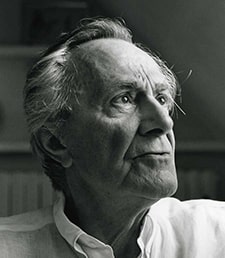Jean-François Lyotard (1924–1998) was a French philosopher whose most famous work—often to his chagrin—was his 1979 The Postmodern Condition. This work examines the term “postmodernism” and its use in other fields, such as the arts and literature, to see how it has been used in Western philosophy.
Lyotard was born during 1924 in Vincennes, France. He was educated at the Paris Lycées Buffon and Louis-le-Grand, and during his teenage years, he dreamed of becoming a Dominican monk, a painter, an historian, or a novelist. However, after studying philosophy, he realized that this was the career for him. He attended the Sorbonne University in Paris, where he became friends with Gilles Deleuze. He subsequently studied philosophy and literature at the Ecole Normale Supérieure, where he again failed the entrance exam.
His early interest in philosophies of indifference led to his Master’s degree. The dissertation argues that indifference is an ethical notion. Lyotard describes his life up until the Second World War as a period of solitary thought and living.
The war disrupted his life and his thinking; he became a volunteer first-aid worker in the fight for liberation in Paris in August 1944, and decided to investigate reality in terms of social interactions. Lyotard became a husband and father in his early twenties, when he married Andrée May in 1948.
Lyotard passed the agrégation exam and took up a position teaching philosophy at a boy’s lycée in Constantine in French-occupied East Algeria in 1950. From 1952 to 1959 he taught at a school for the children of military personnel at La Flèche. In Constantine, Lyotard read Marx and became acquainted with the Algerian political situation, which he believed was ripe for the socialist revolution.
In 1954 Lyotard joined the socialist revolutionary organization Socialisme ou Barbarie. For fifteen years, he was so dedicated to the cause of socialist revolution that he neglected all other aspects of his life. This dedication was so strong that it kept him from engaging in any other activities, with the exception of love. His writings during this period are focused exclusively on ultra-left revolutionary politics, with a strong focus on the Algerian situation (the war of independence had begun in 1954). He contributed to the editorial of the magazine Socialisme ou Barbarie, and wrote pamphlets for distribution to workers at protests and at factory gates.
From 1959 to 1966, Lyotard worked as assistant to the rector at the Sorbonne, then took a position at the Philosophy Department of Nanterre University Paris X. In 1968, Lyotard took part in the political protests known as the “March 22 Movement.” He worked as a researcher at the National Centre for Scientific Research from 1970 to 1979. During the 1970s, Lyotard was appointed to the University of Paris VIII, Vincennes. He was a popular teacher and a prolific writer there. In 1972, he was made a professor of conferences, and in 1987, he retired from his post at Vincennes. Lyotard’s 1979 publication of The Postmodern Condition gained him international fame, and in the 1980s and 90s he gave numerous lectures outside of France.
In 1979 and 1983 he published Au juste (translated as Just Gaming) and The Differend, two works that remain important to anyone thinking about postmodern politics. In his later works, such as The Inhuman (1988) and Soundproof Room: Malraux’s Anti-aesthetics (1998), he concentrated on aesthetics, an enduring topic that he had discussed as early as the 1970s. In April 1998, Lyotard passed away from leukemia in Paris.


